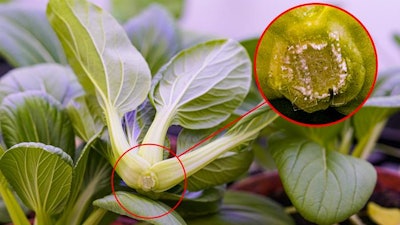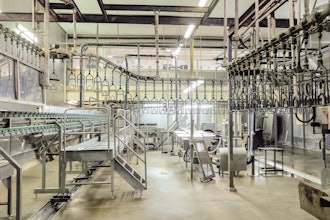
Researchers from MIT and the Singapore-MIT Alliance for Research and Technology (SMART) have shown they can extend the shelf life of harvested plants by injecting them with melatonin using biodegradable microneedles.
More than 30 percent of the world’s food is lost after it’s harvested — enough to feed more than 1 billion people. Refrigeration is the most common way to preserve foods, but it requires energy and infrastructure that many regions of the world can’t afford or lack access to.
The researchers believe their system could offer an alternative or complement to refrigeration. Central to their approach are patches of silk microneedles. The microneedles can get through the tough, waxy skin of plants without causing a stress response, and deliver precise amounts of melatonin into plants’ inner tissues.
“This is the first time that we’ve been able to apply these microneedles to extend the shelf life of a fresh-cut crop,” says Benedetto Marelli, the study’s senior author, associate professor of civil and environmental engineering at MIT, and the director of the Wild Cards mission of the MIT Climate Project. “We thought we could use this technology to deliver something that could regulate or control the plant’s post-harvest physiology. Eventually, we looked at hormones, and melatonin is already used by plants to regulate such functions. The food we waste could feed about 1.6 billion people. Even in the U.S., this approach could one day expand access to healthy foods.”
For the study, Marelli and researchers from SMART applied small patches of the microneedles containing melatonin to the base of the leafy vegetable pak choy. After application, the researchers found the melatonin was able to extend the vegetables’ shelf life by four days at room temperature and 10 days when refrigerated, which could allow more crops to reach consumers before they’re wasted.
For years, Marelli’s lab has been exploring the use of silk microneedles for things like delivering nutrients to crops and monitoring plant health. Microneedles made from silk fibroin protein are nontoxic and biodegradable, and Marelli’s previous work has described ways of manufacturing them at scale.
To test microneedle’s ability to extend the shelf life of food, the researchers wanted to study their ability to deliver a hormone known to affect the senescence process. Aside from helping humans sleep, melatonin is also a natural hormone in many plants that helps them regulate growth and aging.
Pak choy is typically harvested by cutting the leafy plant from the root system, exposing the shoot base that provides easy access to vascular bundles which distribute water and nutrients to the rest of the plant. To begin their study, the researchers first used their microneedles to inject a fluorescent dye into the base to confirm that vasculature could spread the dye throughout the plant.
The researchers then compared the shelf life of regular pak choy plants and plants that had been sprayed with or dipped into melatonin, finding no difference.
With their baseline shelf life established, the researchers applied small patches of the melatonin-filled microneedles to the bottom of pak choy plants by hand. They then stored the treated plants, along with controls, in plastic boxes both at room temperature and under refrigeration.
The team evaluated the plants by monitoring their weight, visual appearance, and concentration of chlorophyll, a green pigment that decreases as plants age.
At room temperature, the leaves of the untreated control group began yellowing within two or three days. By the fourth day, the yellowing accelerated to the point that the plants likely could not be sold. Plants treated with the melatonin-loaded silk microneedles, in contrast, remained green on day five, and the yellowing process was significantly delayed. The weight loss and chlorophyll reduction of treated plants also slowed significantly at room temperature. Overall, the researchers estimated the microneedle-treated plants retained their saleable value until the eighth day.
In refrigerated conditions of about 40 degrees Fahrenheit, plant yellowing was delayed by about five days on average, with treated plants remaining relatively green until day 25.
While the microneedles could make it possible to minimize waste when compared to other application methods like spraying or dipping crops, the researchers say more work is needed to deploy microneedles at scale. For instance, although the researchers applied the microneedle patches by hand in this experiment, the patches could be applied using tractors, autonomous drones, and other farming equipment in the future.
Moving forward, the research team plans to study the effects of a variety of hormones on different crops using its microneedle delivery technology. The team believes the technique should work with all kinds of produce.





















